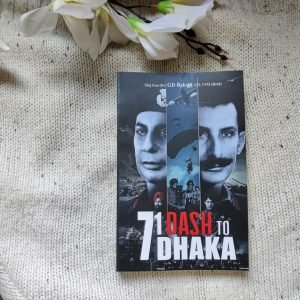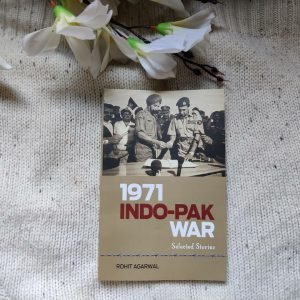-
Night Sky with Exit Wounds by Ocean Vuong
৳ 240.00 – ৳ 320.00He depicts violence in its many forms, whether through the firing of missiles and warfare or guns touted by average folks in America, and the prevalence of domestic violence. Vuong's poetry tends to focus on the fragility of human life, how we often think ourselves invincible, but how easily it can all end. -
War and Secession: Pakistan, India, and the Creation of Bangladesh by Richard Sisson
৳ 320.00 – ৳ 400.00A decade after the 1971 wars in South Asia, the principal decisionmakers were still uncertain why wars so clearly unwanted had occurred. The authors reconstruct the complex decisionmaking process attending the break-up of Pakistan and the subsequent war between India and Pakistan. Much of their data derive from interviews conducted with principal players in each of the countries immediately involved-Pakistan, India, and Bangladesh-including Indira Gandhi and leaders of the Awami League in Bangladesh. -
The Colonel Who Would Not Repent by Salil Tripathi
৳ 360.00 – ৳ 440.00The Colonel Who Would Not Repent” is the remarkable story of one of the twentieth century's most cataclysmic conflicts, the 1971 war which resulted in the creation of Bangladesh. Salil Tripathi describes the social, linguistic, political and cultural fault lines that separated the two parts of former Pakistan -
Bangladesh: The Unfinished Revolution by Lawrence Lifschultz
৳ 260.00 – ৳ 340.00Revolutionary mass upheaval generally weakens the people's respect for authority, law, and discipline; and it brings in its wake social, economic, and political disorders, facilitating the establishment of an authoritarian regime. The French Revolution was based on the ideals of liberty, equality, and fraternity; but the destruction of the old social and political fabric, and the failure to institutionalize the new ideas, led Frenchmen to search for “the man of genius destined at once to carry on and to abolish the revolution.” The Russian Revolution of 1917 was also followed by several years of civil war, which led to the establishment of the ruthless totalitarian regime of Stalin, itself reminiscent of the Thermidorian Reaction. In Algeria, Cuba, China, and North Vietnam, successful mass armed revolutions have been consolidated only because of their one-party dictatorships. -
Operation X: The Untold Story of India’s Covert Naval War in Bangladesh by M.N.R. Samant
৳ 290.00 – ৳ 370.001971. Sheikh Mujibur Rehman in East Pakistan has just won an electoral mandate to become the prime minister of Pakistan. Accustomed to treating the eastern wing of the country as a colony, the ruling disposition in West Pakistan is not pleased, and launches a genocide against the residents of East Pakistan, flooding India with lakhs of refugees. With the violence in East Pakistan reaching a crescendo, the Indian government is faced with a difficult option: remain a mute spectator to the savagery on its eastern borders, or take action and go to war against its western neighbour. Thus was born Naval Commando Operation (X) - comprising Indian navy officers and divers, eight deserters from a Pakistani submarine and a ragtag bunch of Bengali youth fleeing the genocide - one of India's largest clandestine operations, meant to destabilize the West Pakistani efforts to bring East Pakistan to its knees. Revealed for the very first time, here is the explosive authentic account of the guerrilla operation that went for the maritime jugular of Pakistan, and facilitated the birth of Bangladesh -
Dead Reckoning: Memories of the 1971 Bangladesh War by Sarmila Bose
৳ 270.00 – ৳ 350.00This text chronicles the 1971 war in South Asia by reconstituting the memories of those on opposing sides of the conflict. The book challenges assumptions about the nature of conflict, and exposes the ways in which the 1971 conflict is still playing out in the region. -
71 Dash to Dhaka by G.D. Bakshi
৳ 270.00 – ৳ 350.00The 1971 war for the Liberation of Bangladesh was a landmark conflict in the history of South Asia. It dramatically changed the map of this region and marked a historical revival of Indian military power. In just 13 glorious and action packed days - three Indian corps sized spear heads raced for the capital city of Dacca. It was located in the most defensible, riverine terrain in the world. Yet the Indian Blitzkrieg bounced the wide rivers using Helicopters and Paradrops to speed up operations and paralyse the enemy command centre with precision air attacks. The India Air Force generated shock and awe over the battlefields of Bangladesh. Like an expanding torrent of water, the Indian Army bypassed all major centres of opposition in its race for Dacca. Meanwhile the Indian Navy blockaded East and West Pakistan and cut off the two wings of the country. Thus in 13 nail biting days the Indian forces marched on an enemy capital, enforced regime change and induced the largest mass surrender of forces. These were decisive results. This despite the American Seventh Fleet - led by the US aircraft carrier Enterprise, making menacing moves in the bay of Bengal. This is the behind the scenes account of that war - how the critical decisions were arrived at - what major risks were taken and the superb planning and coordination between all organs of the Indian state - political, military, diplomatic and intelligence. It was India's finest hour. It unconsciously revived the Kautiliyan paradigm of war-fighting. The 1971 War for the Liberation of Bangladesh was a historic and epochal conflict that decisively changed the map of South Asia and created a new nation-state with the force of arms. It was a classic tri-service campaign that exhibited dramatic levels of synergy and coordination. It witnessed the march upon an enemy capital, enforced regime change and the mass surrender of armies. These are the hallmarks of a decisive military campaign. The Bangladesh War was a landmark conflict of that era because it broke the Cold War-era pattern of stalemated conflicts, where no victor or vanquished was allowed to emerge for fear of escalation and the involvement of the two nuclear armed super-powers of that era. The super powers would simply not let their client states get defeated or militarily overwhelmed. India broke this pattern by winning an outright military victory - a first in that era of stalemated and limited conflicts. What is even more creditable was the fact that this was achieved in the teeth of fierce opposition by the United States, militarily the strongest super power of the world. -
1971 Indo-Pak War (Selected Stories) by Rohit Agarwal
৳ 230.00 – ৳ 310.00The monograph covers the course of the war, strategies formulated by the opposing commanders, blow-by-blow account of major battles and the lessons learned. Prominent instances of outstanding courage by individuals, meriting gallantry awards, have also received due attention. These are stories of the multitude that formed the cutting edge of the victorious army. The commanding officers, company commanders and junior officers, JCOs and soldiers at the frontlines, those who laid minefields, built bridges or flew helicopters. Or those who ensured the frontline troops remained fed, clothed and supplied with ammunition to fight. The purpose of this book is to record for posterity these subaltern accounts of the war that would otherwise fade into oblivion after a generation. -
The Blood Telegram: Nixon, Kissinger, and a Forgotten Genocide by Gary J. Bass
৳ 340.00 – ৳ 420.00This magnificent history provides the first full account of Richard Nixon and Henry Kissinger’s secret support for Pakistan in 1971 as it committed shocking atrocities in Bangladesh—which led to war between India and Pakistan, shaped the fate of Asia, and left major strategic consequences for the world today. Drawing on previously unheard White House tapes, recently declassified documents, and his own extensive investigative reporting, Gary Bass uncovers an astonishing unknown story of superpower brinkmanship, war, scandal, and conscience. Revelatory, authoritative, and compulsively readable, The Blood Telegram is a thrilling chronicle of a pivotal chapter in American foreign policy.









